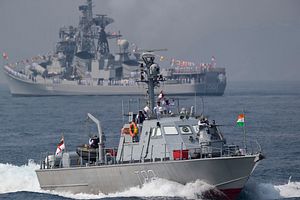As the strategic construct of the Indo-Pacific takes form, the world looks to India – the fourth largest economy in the region and, notionally at least, one of its most formidable military powers – to help uphold order in the maritime theater that construct supports. In many ways, this is not an unreasonable expectation. India’s stakes in the region have never been higher, whether due to commerce or the direct intrusion of powers like China into its immediate strategic space. But more fundamentally, modern history is yet to show us an example of a great multidimensional power that was also not a significant maritime player. As India’s self-described quest to become a leading power continues, will it also eventually become a force to reckon with in the seas?
Writing in a 2013 essay, British military historian Hew Strachan noted: “Geography provides strategy with underlying continuity, a point that is generally true […], but is especially important for the sea.” Indeed, India’s vantage point, at the geographic center of the Indian Ocean, has long led many to believe that Indian dominance over that maritime space is but a matter of time, and that its claim over that space a foregone conclusion. In 1993 a Chinese military officer for the first time articulated his country’s apprehensions about the latter: “We can no longer accept the Indian Ocean as an ocean only of the Indians.”
But India’s geography also significantly constrains its ability to project power in the seas, hobbled as the country is with unsettled land borders with both China and Pakistan. India’s continental compulsions thus include paying sustained attention to land warfare, having fought five land wars in its 72-year history as an independent state. This in turn has dictated service allocations within India’s defense budgets. At the same time, contemporary India’s political aspirations – as well as the ideation of its policy elite – has implied that New Delhi is no longer content to remain a mere regional power whose maritime engagements are strictly pragmatic in nature.
In Strachan’s telling, geography shapes strategy. But strategy is also, as he notes in the same essay, a matter of making choices in the face of constraints. The following is a story of how the Indian Navy continues to balance ambition in face of compulsions – and the extent to which it has been successful in doing so.

































